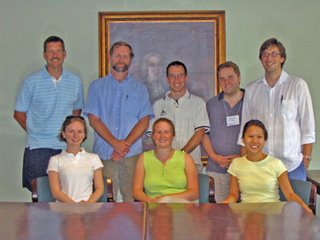We are pleased to announce that Crawford Gribben is the winner of our inaugural gobbet commentary competition. Crawford teaches at the University of Manchester in England and has published a number of works on eschatology in the Puritan period.
We were encouraged by the number and quality of the entries and hope to post another text for comment soon. To read Crawford's comment please click on continue reading. Interestingly, none of the comments picked up on an important historical detail - JE wrote this entry in his "Miscellanies" when he was courting Sarah. Does that add anything?
Gobbet Competition # 1 : July 2006.
Text of Gobbet."Miscellanies" No. 198, Works, 13, 336-337.198. HAPPINESS. How soon do earthly lovers come to an end of their discoveries of each other's beauty; how soon do they see all that is to be seen! Are they united as near as 'tis possible, and have communion as intimate as possible? how soon do they come to the most endearing expressions of love that 'tis possible to give, so that no new ways can be invented given or received. And how happy is that love, in which there is an eternal progress in all these things; wherein new beauties are continually discovered, and more and more loveliness, and in which we shall forever increase in beauty ourselves; where we shall be made capable of finding out and giving, and shall receive, more and more endearing expressions of love forever: our union will become more close, and communion more intimate.
Comment by Crawford Gribben:
If, as C. S. Lewis argued, true happiness is the possession of the beloved at the mutual height of the lovers’ expectation, then, as Edwards argues in the above quotation, the greatest happiness cannot be found in this life. Many kinds of love can be sated – ultimately because the object of that love is finite in its boundaries, and both lover and beloved are changeable in character. The greatest happiness will therefore be possessed by an unchangable lover, an unchanging beloved, and an ever-increasing expectation of greater joy, as both parties realise with gladness the unending potential of ‘all that is to be seen’. In this love, there is no ‘end of their discoveries of each other's beauty’. The truest happiness, like the greatest love, will never have enough of the cause of its joy.
This kind of love, Edwards suggests, patterns the love that will yet exist between one glorified believer and another, and between these saints and their God. In the future state, the greatest commands will be most fully obeyed. In the future state, saints will discover themselves unchangable, and discover themselves to be both the objects and subjects of a love that leads to ever-increasing happiness in the glorification of God’s people. But that happiness will be grounded in God himself, as saints realise his goodness, his eternal love, to themselves as individuals and to the elect in union with Christ. This realisation of ‘an eternal progress’ of divine kindness will result in believers’ continually discovering ‘new beauties … and more and more loveliness’ in their covenant God, in his work of re-creation, in the glorified saints, and even, most strangely of all, in themselves.
The happiness of this future state is made sure by the impossibility that glorified saints should sin. They cannot sin in slackening in their love for God or their glorified neighbours; they cannot be impacted by sin or loss in their surroundings; neither will they find God – the greatest object of their affections – changing in any of his moods.
Their happiness will never lead to complacent satisfaction. Edwards does not teach that the Christian in his future state will have received all for which he longs. The lover will never imagine that he has come to an end of the beloved. Whether enjoying the saints, or their God, the glorified believer will long for ‘more and more endearing expressions of love forever’. His happiness will be characterised by saints’ ‘union … becom[ing] more close, and communion more intimate’.
Lewis recognised this paradox when he explained that he ‘longed most’ when he was most happy. But that longing drove him to the object of his love. That is why Edwards implies that the world to come must always offer, and the saint must always expect, greater anticipations of happiness in the world to come. Satisfaction could not be heavenly. Or, as Baltasar Gracian put it, ‘always leave something to wish for; otherwise you will be miserable from your very happiness.’
continue reading
 Recently, we had the pleasure of hosting Pastor Baek of Revival and Reformation Press in Seoul, Korea at the JEC. Revival and Reformation Press is presently the licensed publisher of the Works of Jonathan Edwards in Korea. They are responsible for the translation of a number of Edwards-related volumes, including George Marsden's Jonathan Edwards: A Life, the Sermons Reader from the Yale Edition, and the "Great Awakening" and "Religious Affections" volumes.
Recently, we had the pleasure of hosting Pastor Baek of Revival and Reformation Press in Seoul, Korea at the JEC. Revival and Reformation Press is presently the licensed publisher of the Works of Jonathan Edwards in Korea. They are responsible for the translation of a number of Edwards-related volumes, including George Marsden's Jonathan Edwards: A Life, the Sermons Reader from the Yale Edition, and the "Great Awakening" and "Religious Affections" volumes. They have also commissioned a new portrait of JE for the covers of their volumes, based on the 1877 Weir portrait that hangs in Yale Div School. It strikes me that the new portrait is especially fitting for their project of introducing JE to a Korean context, as I think that their JE portrait even looks a bit Korean...check it out...
They have also commissioned a new portrait of JE for the covers of their volumes, based on the 1877 Weir portrait that hangs in Yale Div School. It strikes me that the new portrait is especially fitting for their project of introducing JE to a Korean context, as I think that their JE portrait even looks a bit Korean...check it out...






